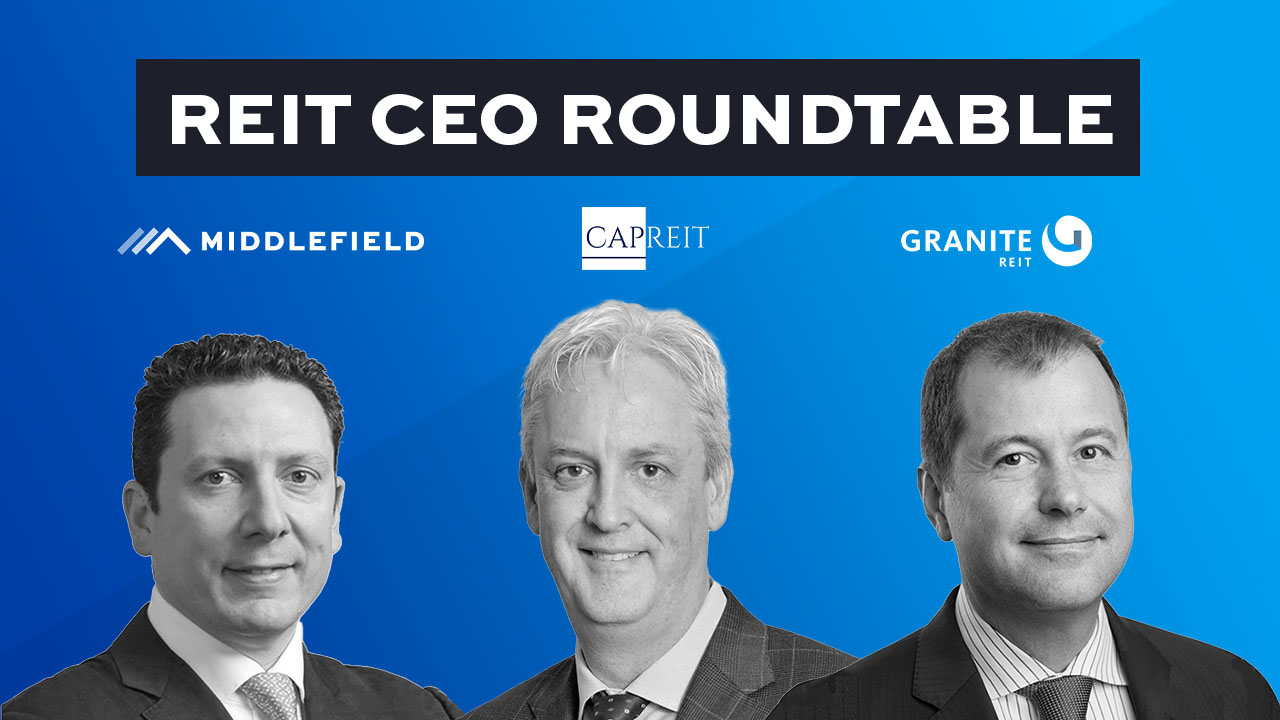As news about Canadian and international markets continues to oscillate between doom and gloom, one investment vehicle is outperforming the status quo. With increasing inflation, rising interest rates, and a global economy on the cusp of recession, Real Estate Investment Trusts (REITs) can still be relied upon to add diversification and higher yield with comparatively low overall risk.
At a roundtable hosted by Middlefield President and CEO, Dean Orrico, industry experts Mark Kenney, President and CEO of CAPREIT (Canadian Apartment Properties REIT) and Kevin Gorrie, President and CEO of Granite Real Estate Investment Trust (Granite REIT) shared their insights about current trends and discussed strategies for leveraging macro and micro environments across the residential and industrial sectors. CAPREIT and Granite REIT have been long-time core holdings of Middlefield’s award-winning real estate funds (ETF | Mutual Fund).
Canadian-based Granite REIT, specialists in the acquisition, development, ownership, and management of logistics, warehouse, and industrial properties throughout North America and Europe, combines a proactive management approach with strategic capital allocation to maximize total returns for unitholders. With 139 investment properties in their portfolio representing over 57 million square feet of leasable area, Gorrie says he’s bullish about industrial REITs in today’s climate.
“From a sector fundamental perspective and considering what Granite REIT focuses on, logistics and e-commerce still remain very strong,” says Gorrie. “The overall vacancy in Europe is 3%, the US vacancy rate is just under 3% as of the second quarter, and for the first time in history, Canada vacancy rates are averaging around 1%.”
Gorrie explains that a pivot in the strength of the company’s liquidity and a focus on buying back units in lieu of pursuing acquisitions is making their current share price very attractive.
With interests in over 67,000 suites, townhomes, and land leased community sites, and a total asset value exceeding $17 billion, growth at CAPREIT is equally robust.
“CAPREIT focuses on the mid-tier, mass market, under $3 per foot monthly rent properties,” explains Kenney. “Fundamentals are rock solid, and the underlying story is incredibly strong, but it’s not a story about demand; it’s a story around undersupply.”
Both Gorrie and Kenney agree undersupply raises questions around regulations and stymied zoning which they attribute to challenges across various levels of government.
Real estate – the great hedge against inflation
While real estate is often viewed as the great hedge against inflation, today’s market is seeing a pullback in REIT trading prices by close to 20%. Orrico puts this conundrum to fellow panelists, asking if investors will see a recovery.
“I firmly believe investors will be vindicated,” says Gorrie. “There’s a valid concern about the rise in the cost of borrowing but we are not a highly leveraged buyer. While a lot of private equity firms leverage at 75%, we finished the second quarter at just under 28%.”
This part of the equation is something Gorrie says is often ignored, noting that the best assessment approach amid inflationary markets is a focus on the fundamentals – a strong balance sheet that drives dividend growth and cash flow.
Kenney puts a finer point on this issue with a reminder that where residential buildings are concerned, the focus has been on yield growth. He advises investors to do their due diligence around NAV methodologies, noting that calculations are conducted differently among different management companies.
CAPREIT uses three different appraisers and conducts a management review every quarter which Kenney says carries more weight than a discretionary NAV. “We’re moving in on $700 million to $1 billion in dispositions this year and we’re selling assets at above IFRS value,” he says.
Undersupply, development charges, and the high cost of construction
Despite expansion into growth markets throughout Canada and internationally, Gorrie says the bulk of Granite industrial development right now will be in the US. “Of the five and a half million feet we’re developing this year, approximately four and a half million is in the US. We were able to lock in costs in early 2022, and because of that our development spread is looking very favourable with leasing rates at 20% above initial forecasts.”
To this, Kenney reiterates that CAPREIT are buyers and not builders. In other words, they’re in the business of raising equity and matching it to acquisitions that allow for value added capital investment and unit price accretion.
“That’s why we issued over $1.4 billion in equity in an 18-month period of time. It’s because we don’t develop,” says Kenney. “We do, however, sit on Canada’s largest residential landbank which is not fully factored into our IFRS valuation and doesn’t take into account development potential.”
Kenney adds that CAPREIT has been buying new assets in Kelowna and Victoria BC, as well as Ottawa and Quebec City, and always at the $3 per foot monthly threshold.
Interest rates and cap rates
Interest rates can cut both ways. When a portion of the balance sheet is borrowed, it is a drag on cashflow, but it also has an impact on valuations.
“We are in a very fortunate position in the apartment space to have guaranteed renewal of CMHC debt financing,” says Kenney. “We’re not exposed to the debt market; we’re exposed to the cost of debt. We are extremely low leverage for the asset class.”
Kenney says CAPREIT looks for non-institutional quality assets that are in potential development locations. “We are one of the only REITS in the last quarter writing down our assets in the apartment space because there were no trades to compare to. We expected the suburban assets to get hurt, but so far there’s no evidence of that. They’re holding up remarkably well.”
Gorrie says the industrial space saw a difficult second quarter for the same reasons Kenney points out. “We were relatively confident the discount rates would move, so we adjusted our discount rate across the entire portfolio,” he says, noting the expectation for the third quarter is much of the same.
Moving forward
Panel members agree that judicious geographic diversification that includes a significant footprint in Germany, Western Europe and the US has buoyed REIT fundamentals. For Canada to measure up amid market volatility and zoning constraints, panelists say a lot has to be done to improve municipal regulations and by educating government.
“All industries have an obligation to educate government on the issues their businesses face,” says Gorrie. “Politicians can’t be expected to be masters of all industry knowledge. We have an obligation to open discussions, especially at the federal level because real estate is within the purview of the provincial jurisdiction.”
Building resilience into the supply chain is a worthy goal that panelists say depends on regulatory bodies taking a page from their international counterparts to help direct investment into domestic interests.
Meanwhile, diversified portfolios at both CAPREIT and Granite REIT are what’s placed the companies in enviable positions, and a key reason why they make up the largest weightings within the real estate strategies at Middlefield.

Whether you have specific investment inquiries or general questions about Middlefield, our team would be glad to help.
Contact Us
Disclaimer
Commissions, trailing commissions, management fees and expenses all may be associated with mutual fund investments. Please read the prospectus before investing. You will usually pay brokerage fees to your dealer if you purchase or sell units/shares of investment funds on the Toronto Stock Exchange or other alternative Canadian trading system (an “Exchange”). If the units/shares are purchased or sold on an Exchange, investors may pay more than the current net asset value when buying and may receive less than the current net asset value when selling them. There are ongoing fees and expenses associated with owning units or shares of an investment fund. An investment fund must prepare disclosure documents that contain key information about the fund. You can find more detailed information about the fund in these documents. Mutual funds and investment funds are not guaranteed, their values change frequently and past performance may not be repeated. Certain statements in this disclosure are forward-looking. Forward-looking statements (“FLS”) are statements that are predictive in nature, depend upon or refer to future events or conditions, or that include words such as “may”, “will”, “should”, “could”, “expect”, “anticipate”, “intend”, “plan”, “believe”, or “estimate”, or other similar expressions. Statements that look forward in time or include anything other than historical information are subject to risks and uncertainties, and actual results, actions or events could differ materially from those set forth in the FLS. FLS are not guarantees of future performance and are by their nature based on numerous assumptions. Although the FLS contained herein are based upon what Middlefield Funds and the portfolio manager believe to be reasonable assumptions, neither Middlefield Funds nor the portfolio manager can assure that actual results will be consistent with these FLS. The reader is cautioned to consider the FLS carefully and not to place undue reliance on FLS. Unless required by applicable law, it is not undertaken, and specifically disclaimed that there is any intention or obligation to update or revise FLS, whether as a result of new information, future events or otherwise.
This material has been prepared for informational purposes only without regard to any particular user’s investment objectives or financial situation. This communication constitutes neither a recommendation to enter into a particular transaction nor a representation that any product described herein is suitable or appropriate for you. Investment decisions should be made with guidance from a qualified professional. The opinions contained in this report are solely those of Middlefield Limited (“ML”) and are subject to change without notice. ML makes every effort to ensure that the information has been derived from sources believed to reliable, but we cannot represent that they are complete or accurate. However, ML assumes no responsibility for any losses or damages, whether direct or indirect which arise from the use of this information. ML is under no obligation to update the information contained herein. This document is not to be construed as a solicitation, recommendation or offer to buy or sell any security, financial product or instrument.













